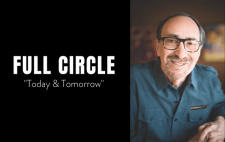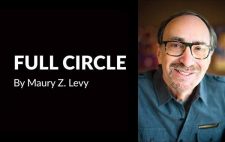This was a Sunday like any Sunday. Big and fat and lazy, lazy like a screen door breeze, fat like a Sunday paper.
The ring of the harvest-gold kitchen phone broke the silence of the black and white book reviews.
“This is Agent Victor Harrison.”
Agent? Insurance agent?
“FBI agent. Philadelphia office. Is this Maury Levy?”
“How did you get my number?” I said. “It’s unlisted.”
“We’re the FBI, Mr. Levy. It’s what we do.”
This was my first warning that the FBI was tapping my phone, listening to every conversation. What they were looking for was evidence of my consorting with radicals.
This was back in the radical ’70s, before Edward Snowden was born.
I had recently written a long story on a young black preacher named Muhammad Kenyatta. Kenyatta used to break into white churches on the Main Line and demand reparations for slavery.
I didn’t hear from Kenyatta after the story. But a few months later, a big manila envelope landed on my desk, sent through the U.S. Mail. I opened it and found copies of FBI surveillance files, files that had been stolen from the Bureau’s Media, Pa. office in one of the most brazen crimes of the 20th century.
There was no return address on the package, no note that went with the files. Who sent them to me? That’s what the FBI wanted to know. My boss insisted that we turn the files back over to the Bureau immediately.
“Don’t read them, don’t even touch them,” he told me. “You could be committing a federal crime and be a conspirator after the fact.” And so, while waiting for the FBI to come pick them up, I read them. I never was very good at following instructions.
There were significant mentions of Kenyatta in the files. He was one of the people they were following. But there was no proof that he did the break-in or sent the files.
But the FBI suspected Kenyatta. And since I had spoken to him from home a number of times while I worked on the story, they suspected me. Of what they weren’t sure.
The calls from Agent Harrison would become a regular part of my Sunday routine. Clearly, he could have called me at the office. But calling at home was a little more intimidating.
By tapping my phone, by listening to my every conversation, the FBI was looking for some tie-in between me and the break-in. They were looking for secrets. What they found was my wife making carpool arrangements for her ladies’ bowling league. And my mother, who ran a kosher kitchen, making plans to go to my sister’s house to eat Chinese food. The latter was the biggest secret in my family. Even my father didn’t know that my mother ate Chinese food.
“My God,” said Agent Harrison. “You lead the most boring life.”
But he kept asking me questions about Kenyatta. I told him that everything I knew was in my story. It was very long. But he kept pushing.
“Would you be willing to serve your country?”
“How?”
“We have another case against Kenyatta in the South. We’d like you to testify, to tell everything you know about him.”
“Where?” I asked.
“Jackson, Mississippi,” he said.
“Are you serious?” I said. “Have they ever seen a Jew in Jackson, Mississippi?”
He laughed. “No, you’ll be their first.”
The calls and the pressure continued for months. Every Sunday like clockwork. And then a strange thing happened. Kenyatta died. And the phone calls stopped.
You might ask – was this the end of the FBI tapping me? And the answer is – I don’t know. But I will say this: If you have any secrets to tell me, you might want to drop them in the mail.












